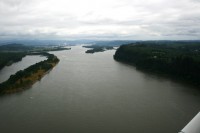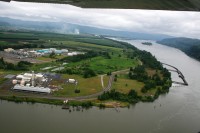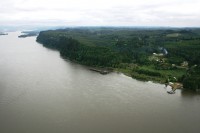Citizens concerned about health risks
(Feb. 9, 2012) The Port of St. Helens recently disclosed a proposal for a coal export terminal located on the Columbia River 48 miles downstream of Portland. Energy giant Kinder Morgan and a company called Pacific Transloading LLC were granted lease options Jan. 25, despite overwhelming testimony opposing the coal terminals.
“Coal has a terrible track record,” stated David Scharf, a Scappoose resident with Columbia County Citizens for Human Dignity. “It’s dusty, contains toxic pollution, and causes lung disease, in addition to the impact to public safety of having our community and emergency services cut in half every day by coal trains.”
As the United States burns less and less coal due to its harmful health effects, coal companies are seeking to export U.S. coal to Asia. Proposed coal terminals in Longview and Bellingham, Washington, have been highly controversial due to the harm to public health, dirty coal dust, and the impact of coal trains on local businesses.
Millennium and Arch Coal proposed to ship 60 million tons per year from Longview. If the St. Helens proposal is similar in size, 24 coal trains per day (12 full and 12 empty trains) would travel to and from the terminal each day. The unit trains are over one mile long and would pass through Rainier, Columbia City, St. Helens, Portland, and the Columbia River Gorge. Kinder Morgan has not yet disclosed the size of the facility or rail route.
“A large number of coal trains would be a disaster in our town,” stated Pat Zimmerman, a former Port of St. Helen’s Commissioner. “I don’t want coal dust in our crops, our homes and boats, or the lungs of our children. I also don’t want coal trains blocking our main intersections and disrupting our local businesses.” At proposed coal terminals in Longview and Bellingham, WA, mile-long coal trains would enter and leave the terminal every hour.
The Ports of Tacoma, Portland, Vancouver, Kalama, and others have recently rejected proposals to build coal export terminals. The Port of Vancouver raised concerns about coal dust affecting neighboring businesses. The Port of Portland noted, “the Port needs to be reflective of the community and its values. Coal doesn’t seem to fit within those values.” In addition, the Port of Vancouver’s Executive Director noted that coal is a “risky” business bet because “coal facilities have a tendency to come and go,”
“These terminals and coal trains are extremely dirty,” stated Brett VandenHeuvel, Executive Director of Columbia Riverkeeper. “Toxic coal dust is a real threat to the health of our communities and our river.”
"Oregonians have worked hard in the past few years to move beyond coal and invest in cleaner, safer industries - exporting dangerous and increasingly expensive coal through Oregon ports would be a huge step backward," stated Cesia Kearns of the Sierra Club Beyond Coal Campaign.
View our fact sheet on the Impacts of Coal Export at Port of St. Helens
Join us in speaking out:
- Coal dust contains toxic heavy metals and has been associated with emphysema, chronic bronchitis, and malignancy.
- Increased diesel emissions from coal trains cause increased lung disease in kids and increased asthma attacks.
- Coal export will bring thousands of coal trains per year through Oregon, including St. Helens, Portland and the Columbia River Gorge.
- Burlington Northern estimates trains lose 500 to 2000 pounds of coal per car during transport. There are about 125 cars per train. Coal dust coats homes, boats, and crops.
- Similar coal terminals require 10 to 20 coal trains per day. Coal trains will block traffic, harm business, and delay access to emergency vehicles.
Learn more about Riverkeeper's fight against coal export on the Columbia:
[youtube]http://www.youtube.com/watch?v=biuUw60jCwU[/youtube]






